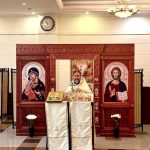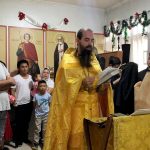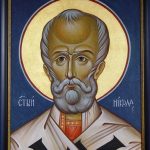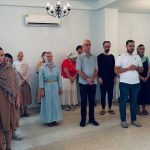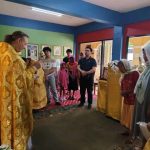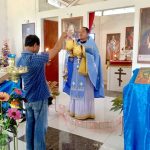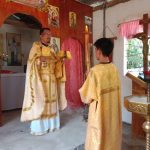In the famous parable the rich man in the hell begged to send Lazarus from Paradise to his alive relatives to warn them about the consequences of a sinful life, but he was denied for such a reason: if they believe neither Scriptures nor the prophets, they will not believe the one who has risen from the dead. But, as if to prove this, God raised up another, but also Lazarus! And so-those who did not want to believe Christ, instead of glorifying Him, decide that they will kill them both. In our time, more than a hundred thousand “Lazarus” have had the experience of clinical death, but it only confirms the words of the gospel that even the miracle of the resurrection will not correct non-believers…
On Lazarus Saturday, we celebrate the miracle of Lazarus ‘ Resurrection. The Lord loved him and his sisters, often visited them, and called Lazarus his friend. Therefore, when the Saviour learned of his death, He was ” grieved in spirit and indignant.” After listening to Martha and Mary, who testified their faith that if the Lord had been with them, their brother would not have died, Christ went to the cave and raised the four-day-old dead man. In this way the Lord revealed his nature: he wept as a man, but raised Lazarus, revealing himself to be God. It was a miracle that destroyed the last doubt that Christ was the Messiah. After this great event, all the people of Israel gathered to meet the Savior at Passover in Jerusalem to glorify Him.
By raising Lazarus, the Savior also showed the possibility of his own Resurrection. As well as the fact that faith and prayers for other people can save them even in death, as the faith of the sisters Martha and Mary saved their brother Lazarus.
And the resurrected Lazarus lived for another 30 years, became a Bishop on Cyprus, and, according to tradition, never laughed to death.
Patriarchal message to the archpastors, clergymen, monastics and laypeople of the dioceses in the territory of Russia
At this difficult time, when the governmental authorities are taking all possible
measures to prevent the spread of the coronavirus infection, I call upon the hierarchs,
clergy, monastics and laypeople to intensify your prayer to the Lord for the deliverance
of people from the harmful epidemic, and I call upon the arhpastors and pastors to
continue to zealously celebrate divine services and especially the Holy Eucharist – the
Sacrament of the Body and Blood of Christ – even in the absence of the flock due to the
authorities’ respective recommendations. “Indeed, nothing is to be preferred to the Work
of God” (The Rule of St Benedict of Nursia, chapter 43).
Today many of us are compelled to take upon themselves the feat of constantly
staying in their homes. To them I am saying: let the place of your solitude become a desert
of your personal and domestic work of prayer, according to the Gospel: “But thou, when
thou prayest, enter into thy closet, and when thou hast shut thy door, pray to thy Father
which is in secret; and thy Father which seeth in secret shall reward thee openly” (Mt
6:6). May in this feat we also be inspired by the example of the Venerable Mary of Egypt
who had spent many years in the desert in solitary prayer.
These days we are losing an opportunity to attend together the Lenten divine
service, which we all hold dear. Yet, we know that even the gates of hell cannot prevail
against the Church of Christ (cf. Mt 16:18). “Who shall separate us from the love of
Christ? shall tribulation, or distress, or persecution, or famine, or nakedness, or peril, or
sword? <…> in all these things we are more than conquerors through him that loved us
<…> neither death, nor life, nor angels, nor principalities, nor powers, nor things present,
nor things to come, nor height, nor depth, nor any other creature, shall be able to separate
us from the love of God, which is in Christ Jesus our Lord” (Rom 8:35-39). Even while
in forced separation, as throughout history followers of Christ often found themselves
scattered over deserts and mountains, caves and gorges of the earth, we remain the
inviolable community of faith united by the prayer which we offer to the Lord Jesus in
our heart. In this prayer we are not alone – standing together with us before God’s Altar
are our holy kinsfolk, the saints of the Russian Church from all epochs of her historical
being, inspiring and encouraging us. “Take heart, the Church of Christ <…> for the
friends of Christ are taking care of you – those standing in the presence of Him and
gathered round Him” (Sessational hymn after the Polyeleos during the Service to the New
Martyrs and Confessors of the Russian Church).
Brothers and sisters, let us endure temporary privations in order to preserve the life
and health of our neighbours. Let us patiently undergo the affliction which has befallen
us in the firm hope that the Almighty Lord, Who took upon Himself the sufferings and
death on the cross for humankind and Who by His Resurrection opened for us the path to
salvation, will in good time change this affliction into the joy of the meeting in praising
Him by our joint prayers in a church during the divine service, “and the Lord God will
wipe away tears from off all faces; and the rebuke of his people shall he take away from
off all the earth” (Is 25:8).
In these days let us lift up fervent prayers for those who are selflessly striving to
put an end to the pestilent epidemic and those who are working to sustain the life of our
cities, towns and villages. Let us be grateful to them and give them all the support we can.
I also thank all of you, dear Vladykas, fathers, brothers and sisters, for your zealous
service to the Lord, to His Church and to each other.
I am unceasingly praying for all of you.
+KIRILL
PATRIARCH OF MOSCOW AND ALL RUSSIA
Beginning of our salvation
It is believed that the main holiday of the Most Holy Theotokos is the Dormition. But it is for reason that the Holy Church sings at the Annunciation: “Today is the beginning of our salvation!” And the whole life of our Lady is for this day. “The Word became a human being” is about today’s event. She herself prophesies about this day: “From now on, all generations will call Me blessed”
For 55 centuries, the Creator waited for this most honest vessel to become a part of the visible world to save it. He could have waited longer. This is why it is so important to understand that if it were not for the purity and humility of the Holy Virgin, we would still be living without the Savior (or rather, we would not be living at all). Because neither before nor after was there on Earth like Her. That is why we will always sing the Archangel hymn to Her:
Rejoice, Gracious One! The Lord is with Thee!
Metropolitan Hilarion of Volokolamsk: We will definitely celebrate Easter
During the coronavirus pandemic the Church has to make innovative decisions in order to comply with the instructions of the authorities, to protect not only the physical life and health of people, but also the spiritual one. Metropolitan Hilarion of Volokolamsk, head of the Department for external Church relations of the Moscow Patriarchate, told RIA Novosti in an exclusive interview about his view on the second address of the President to the Russians and new measures to combat the epidemic, on the possibility of combining them with Church life, the upcoming Holy week and the celebration of Easter (this year on April 19).
— Vladyka, how would you comment on the second address of the President in connection with the spread of the coronavirus and new measures to combat the epidemic, in particular, the extension of the non-working period until April 30?
— An important and timely request. The President does everything to save people’s lives. Extending the weekend for another month will bring multibillion losses to the country, reduce the pace of economic development, and hit the wallets of ordinary citizens. This has already happened. But people’s lives are above all else, and no amount can compensate for the lives that will be lost as a result of non-compliance with sanitary measures. Therefore, I strongly support the strict measures that are being introduced. Every life has value, and any life saved is more important than economic achievements. We are seeing an increase in the number of people infected and dying, but let’s not forget that if there were no such measures, the numbers would be very different. The President stressed that if the situation allows, the quarantine period will be shorter. We would like that very much. But we understand that the peak of the disease is probably still ahead, and we need to do everything to make sure that as few people as possible are infected.
— How will the long-term nationwide quarantine affect the income of clergy, many of whom have large families, and will churches go bankrupt?
— The Church will not leave its priests and their families in this difficult situation. Maybe this whole situation will allow the society to finally fix in their minds the fact that Yes, the parish feeds the priests. The media, especially the so-called opposition and liberal media, constantly spread stories about the allegedly fabulous income of the clergy, about the limousines that priests allegedly drive around in. But there is none of this — no fabulous income. Most priests, with a few exceptions, live very modestly. And the Church exists solely on the donations of parishioners, it does not receive any subsidies from the state. Of course, the church will not go bankrupt, but in parallel with the sharp reduction in income, which is inevitable, we will have to reduce spending. Somewhere, perhaps, it will be possible to organize the submission of memorial notes online and the transfer of donations online. Only it is very important that no price lists appear anywhere: this costs so much, and this-so much. Donations can only be voluntary, and the amount must be determined by the donor. And if he can’t donate anything at all, then that shouldn’t be an obstacle to accepting a commemoration note from him.
— How can the Church support the parishionners, and what kind of support do you expect from the faithful?
— All social services of parishes, courtyards and monasteries are instructed by the Patriarch to provide assistance to those people who are at risk, if possible. What kind of help can it be? Delivery of food and medicine. Of course, this includes pastoral support on an individual basis, in compliance with all the rules of individual protection. In other words, priests will come to the homes of the elderly and the sick in order to confess, give communion, and assist them, as they always did before the introduction of sanitary measures.
Every situation of crisis is also a situation for new opportunities. Today, our faithful have a unique opportunity to create what the Apostle Paul called a “home Church”. After all, the Christian family is a Church in miniature. Jesus Christ said: “Where two or three are gathered in My name, there I am in the midst of them” (Matt. 18: 20). He didn’t say, “where a hundred or two hundred or five hundred people will gather,” but he said, “two or three.” Where do people most often gather in twos and threes? In the family. Now is the time to think: do we often pray together with our loved ones, children, and parents? After all, in many families, the day begins with a fuss: children are in a hurry to go to school, dad and mom – to work, to have time to eat, but not to be late for the bus. And there is no time to pray. And in the evening, everyone is tired, I want to talk and watch TV. Well, it seems like, and again I have no time to pray, and I’m getting sleepy. Building a home Church is the most important task of every Christian. We often have such a peculiar consumer attitude to the Church: we will submit notes, and the priest will pray. The Church is perceived as a combine of funeral services, where you can come, order a service, get it, and then let life go its own way. Meanwhile, the Church should have a direct continuation in Christian families. Those who have not yet created their own home Church have a unique chance to do it.
— Isn’t it a sin to prepare for holidays and celebrate, even Easter, in such a difficult period for everyone in General? Is the emphasis of the holiday shifting and how do you think?
— On the contrary! The feast of the Resurrection is a celebration of victory over death. We will definitely celebrate Easter, even if we can’t come to the temple. Remember the Soviet times. Not all believers could get to the Church on Easter. Police cordons stood, young people were not allowed in. And there were no live broadcasts of services on TV at that time. Where was Easter celebrated? In their secret home churches, in their families.
— Under the new measures, going to the temple is fined, and any police officer has the right to stop me and turn me around halfway. Is this normal for believers? And if the temple is closer than a hundred meters from the house, closer to the store, then you can enter it or not?
— This is an interesting question, thank you for being open. Much will depend on the region. As well as the clarity of actions of Federal and local authorities. In some regions, there is no quarantine at all. And in Moscow, a self-isolation regime has been introduced, but how it works in practice is not yet clear to everyone. At first they said that they would give special passes to employees of those institutions that are not closed. Then they said that there would be no special passes. We are currently preparing our own certificates for clergy and Church workers.
— Will the clergy continue to serve in monasteries and churches on Easter and in General every day, as usual, until April 30, or will something change?
— Services in monasteries and parishes do not stop for a day. There is a lot of misinformation about this right now. Here somewhere even with a reference to me wrote that the sacrament of Communion will not be performed. That’s not true, I didn’t say that. All services and all sacraments will be performed. But the issue of admitting believers to churches will be resolved differently in each region and in each diocese, depending on the epidemiological situation. Somewhere there may be a situation that you will have to serve behind closed doors. Somewhere, a small number of believers may be allowed to be present at the same time.
— How do you think the situation will develop further, especially palm Sunday (April 12), Holy week (from April 13) and Easter (April 19)? If I, for example, want to come and light a candle and hand over notes — will they let me in?
— As I have already said, the doors of all churches in Moscow are currently open, but the Patriarch urged the laity to stay at home. And in other regions-in different ways. It is not yet clear how the situation will develop in each particular region. Therefore, the most correct thing is to stay at home, do not go out, and observe a self-isolation regime. I think that before Holy week, each diocese will adopt and voice recommendations regarding the possibility or impossibility of visiting the Church.
— Consecration of cakes, eggs, exchange of gifts, common meals – can all this be canceled? How then can people express their joy and share it?
— A common family meal — why not? Inside their home Church, each family can bake Easter cakes and dress up on Easter night after watching the broadcast of the Patriarchal Easter service from the Cathedral of Christ the Saviour. And if it happens that somewhere it will not be possible to bless cakes, eggs and Pascha (Easter sweet cheese with raisins), then you will have to imagine how during the seventy years of Soviet period, many believers were deprived of this opportunity. And when next year we all come to bless the cakes, we will remember once again this year of the Easter lock and will be glad that many of us did not appreciate: the opportunity to freely come to the temple and pray together. Let’s not dramatize the situation. Several generations in our country have lived in conditions of persecution of the Church. In the 1930s, most of the churches were closed, the priests were shot, and in many cities and villages it was impossible to come to the Church, take communion, or baptize a child. And so the Church lived for decades. Now, thank God, none of this is happening. We have complete freedom to live a full Church life. We are only temporarily in a situation where we are prescribed self-isolation. Let’s go through this time with humility and calm. Let’s work together to save as many lives as possible. For this, the Lord will reward each of us. But carelessness will be punished.
04/04/2020
Mary of Egypt
“The Standing of Mary of Egypt” on last Thursday is the culmination of Lent. In the Church for two months now, we have been taught examples of piety: the repentance of publicans and fornicators, icon worship and hesychasm. Like the Tree of life in the middle of Paradise, the Cross of the Lord is brought to us for worship in the middle of the Lent. As a guide to heaven, “The Ladder” of St John is recommended. And as the highest example of repentance (not for imitation, but for admiration) – the life of St. Mary. The fragile female nature was capable of impossible feats, surpassing the greatest men of desert. Her story fits into a few paragraphs, but can you imagine 47 years in the desert without food and clothing? What willpower and desire to please God helped her endure the external and internal fire? On the day of her memory – on the 5th Sunday of Lent – the Canon at Matins commemorates the righteous Job and the poor Lazarus: “As Job in leprosy, eaten by worms, so Lazarus before the gates of the rich prayed: blessed is the God of our fathers. And no one gave him even a crumb from the rich man’s table, but he received instead the bosom of Abraham.” Because none of our sacrifices, nothing earthly, can compare with what God has prepared for those who love Him. “The Kingdom of heaven is like a merchant who, had found one pearl of great price, went and sold all that he had, and bought it” (Matthew 13: 45-46). This pearl is Christ. To be with Him, true Christians are willing to bare with suffering, privation, and even premature death. The main thing is that both life be Christ and death be gain (Epistle to the Philippians, 1: 21).
We worship Thy Cross
The Lord wants real repentance and sincere prayer from us. “My soul! The end is coming”, sung in the Canon of St Andrew of Crete. Unfortunately, we only wake up in times of great danger. That’s why sorrows are allowed. They are not always a punishment for sins, because the righteous also suffer. But suffering makes us spiritually stronger, higher. “Whoever wants to follow Me, take your Cross” – says the Lord in today’s gospel reading. This means: if you want to go to heaven, accept your fate and forget about yourself. For eternity is for the meek. The proud won’t get along with it.
In the parishes of the diocese, on the Sunday of the Veneration of the Holy Cross, prayers were served for deliverance from the epidemic. Services at this particular time are performed with all relevant precautions
Prayer for deliverance from pestilence
President of the Philippines R. Duterte declared the next week a Week of National Prayer for deliverance from the coronavirus infection.
His Holiness Patriarch of Moscow and All Russia Kirill approved prayer requests in connection with the threat of spreading coronavirus infection.
Petitions will be offered at the Divine Liturgy in all the churches of the Russian Orthodox Church.
Earlier, the Holy Synod at a meeting on March 11 this year adopted a Statement in connection with the spread of coronavirus infection.
“During the times of epidemics, the Russian Orthodox Church has always carried out its witness service, not denying anyone spiritual care and full participation in its Sacraments,” the statement says. — We call for restraint, preservation of sobriety and prayerful calm, we draw attention to the fact that a believer should not give in to panic and fears associated with the spread of unverified information about infection. At the same time, it is unacceptable to treat coronavirus infection lightly, ignore medical prescriptions, ignore preventive measures, exposing yourself and others to the risk of infection.”
Petitions at the litany of fervent supplication at the Divine Liturgy, offered during the spread of a malicious plague:
“Again we pray Thee, O Lord our God, to mercifully deliver us from the ruinous plague threatening to us and to spare Thy faithful people of death of soul and body; to the heal the sick, and to protect and save us, O merciful Lord, soon hearken and have mercy on us.
Again we pray for calming of the confusion and disturbance of people, for protection of the faithful with a firm hope, and for planting peace and silence in our hearts, O Lord, we pray Thee, hearken and have mercy.”
Prayer during the spread of a malicious plague:
“O Lord our God, do not enter into judgment with Thy servants, and protect us from the pernicious pestilence threatening to us. Have mercy on us, Thy humble and unworthy servants, who fall down in repentance with warm faith and heartfelt compunction to Thee, our merciful God, and we trust in Thy compassion.
For it is Thine to have mercy on us and save us, O our God, and to Thee we send up glory, to the Father, and to the Son, and to the Holy Spirit, now and ever, and to the ages of ages. Amen.
Press service of the Patriarch of Moscow and all Russia
Instructions to the rectors of parishes and courtyards, Abbots and Abbesses of monasteries of the Russian Orthodox Church in connection with the threat of spread of coronavirus infection
The document was approved by the decision of the Holy Synod of March 17, 2020 (journal # 30).
For the sake of pastoral care of people, as well as in response to the request of the sanitary authorities, while maintaining a firm faith in God’s good Providence and in Divine omnipotence, the following rules are adopted, taking into account the canonical and liturgical Traditions of the Russian Orthodox Church.
Until the epidemiological situation changes for the better and the diocesan administration gives appropriate instructions to terminate this instruction in full or in part, the following must be done in parishes, Patriarchal, Episcopal and monastic buildings, as well as in stauropigial and diocesan monasteries of the Russian Orthodox Church.
Concerning The Communion Of The Holy Mysteries Of Christ
1. Bearing in mind that the offering of a Bloodless Sacrifice can never be canceled, because where there is no Eucharist, there is no Church life, and also that the Holy Body and Blood of Christ are taught for the health of both the soul and the body (see, for example, the prayers of St. John Chrysostom, the 7th and 9th of the Preparation to Holy Communion), taking into account, however, the historical practice of the Orthodox Church in the conditions of epidemics[1], — Communion of the Holy Mysteries of Christ is to be done with wiping the spoon with an alcohol-soaked cloth after each communicant (with regular renewal of the impregnation) and then dipping the spoon in water with respective disposal of water.
2. The water after Communion must be served separately for each participant in disposable glasses.
3. Use disposable sanitary gloves to distribute the antidoron.
4. Cloth for the communion of the laity must be used only to protect the Holy Mysteries from possible falling on the floor and for wiping the spoon only. Wiping of the mouths of the communicants must be with paper napkins which will be burnt. The cloths should be boiled and washed with due reverence after each liturgical use.
5. Communicants should refrain from kissing the Chalice.
Concerning the performance of the sacraments of Baptism and Anointing
6. Strictly adhere to the practice of changing and consecrating water for each individual case. In this regard, the sacrament of Baptism is performed only individually with intermediate disinfection (wiping) of the font (baptistery) with a disinfectant liquid.
7. For anointing with oil, use a cotton swab (instead of a string) and a paper napkin (instead of a sponge), followed by burning.
Concerning the performance of the sacrament of unction
8. When anointing the sick in the temples, use for each parishioner individually disposable cotton swabs, which must be burnt.
Other instructions regarding the performance of services, pastoral practice, and parish life
9. Instead of presenting the cross for kissing at the end of the divine Liturgy and other services, it is recommended to place the cross on the heads of parishioners.
10. Returning to the statutory practice, which has been changed in recent years, anointing at the all-night vigil is performed only in cases when the litias and the consecration of oil are performed. When anointing use for each parishioner separately a disposable string (a cotton swab) with subsequent disposal. In other cases, perform kissing of the gospel or a festive icon (cross) after the polyeleos only with the blessing of the priest and wiping the gospel and icon (cross) after each kissing using a disinfectant solution.
11. Clergymen are advised to refrain from offering their hands for kissing.
12. Use disposable hygiene gloves to distribute the prosphora and consecrated bread at the all-night vigil.
13. Pay special attention to the cleanliness of utensils and liturgical vessels, wiping them after each liturgical use and thoroughly washing them with boiling water.
14. Suspend the work of Sunday schools, as well as parish sections and activities until further notice.
15. If possible, the social services of parishes and monasteries should help elderly parishioners to deliver food and essential goods to their homes.
General instructions
16. Abbots should instruct employees of parishes and monasteries to strictly observe general hygiene measures, including hand disinfection during the day (at least once every 2 hours).
17. Provide frequent airing of churches, parish and monastery premises.
18. Regularly treat the surfaces of temple furniture (including places for writing notes, candle boxes, etc.), as well as door handles with disinfectant solutions.
19. Regularly treat with disinfecting solutions icons located in the Church, which are applied to the parishioners.
20. Clergymen, clergy, and employees of parishes and monasteries should be responsible and attentive to their well-being. If you feel unwell, immediately inform the rector and seek medical help.
21. Abbots and rectors are required to measure the temperature before the start of the working day (for example, using a non-contact thermometer) for priests, clergy, and church employees who interact with a large number of parishioners.
22. Explain to parishioners that the implementation of the imposed regulations and restrictions should be performed as following the words of the Holy Scripture:” do not tempt the Lord your God ” (MT. 4:7). Also explain to parishioners that in case of symptoms of flue or other infectious diseases, they should refrain from visiting churches for the sake of love for their neighbors and care for them.
[1] – in particular: communion of patients with infectious diseases after other communicants (or even at a separate service) with wiping after each communicant with a cloth and then burning it; the use of a separate vessel for the patients and the spoon, washing them in vinegar with the pouring of the latter into a dry well
STATEMENT OF THE HOLY SYNOD IN CONNECTION WITH THE SPREAD OF CORONAVIRUS INFECTION
The document was adopted at the meeting of the Holy Synod of the Russian Orthodox Church on March 11, 2020.
The Holy Synod of the Russian Orthodox Church is concerned about the spread of coronavirus infection in the world and its consequences for millions of people, many of whom are not only facing the threat of infection, but have also experienced the socio-economic consequences of this disaster.
Members of the Holy Synod express their condolences to the relatives and friends of the victims of this disease in China, South Korea, Iran, Italy, France, Germany, Spain and other countries.
Blessed before the Lord are the works of doctors and volunteers who develop and implement medical and preventive measures aimed at helping the sick and preventing the further spread of the disease.
During the times of epidemics, the Russian Orthodox Church has always carried out its witness service, not denying anyone of spiritual care and full participation in the Holy Sacraments. We call for restraint, sobriety and prayerful calm, and we draw attention to the fact that a believer should not give in to panic and fears associated with the spread of unverified information about infection.
At the same time, it is unacceptable to treat coronavirus infection lightly, ignore medical prescriptions, ignore preventive measures, exposing yourself and others to the risk of infection.
The Holy Synod considers it important to consistently and strictly observe sanitary and hygienic measures of a preventive nature in parishes and monasteries, especially in those regions where the epidemiological situation is officially recognized as severe, including the wider use of sanitary solutions to disinfect icons and the use of disposable drinking cups.
If a coronavirus infection spreads in a particular region, additional preventive measures should be applied in consultation with the clergy.
The Holy Synod calls on archpastors, pastors, monastics and laypeople of the Russian Orthodox Church to intensify prayer for overcoming the disease and for giving strength to doctors who are struggling with it.
Патриархия.ru







